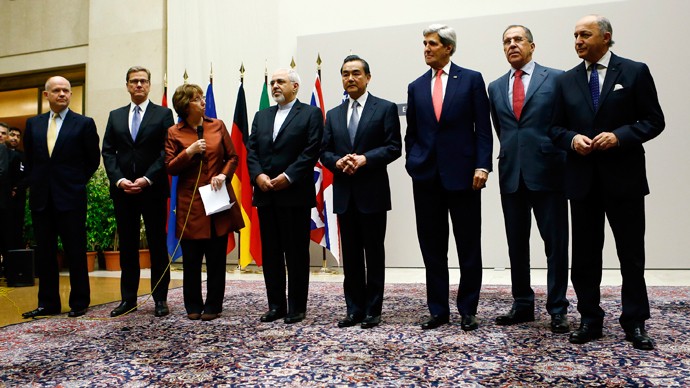(VOVworld)- The historically significant nuclear agreement reached recently between Iran and the P5+1 group after nearly a decade of failed efforts is just a temporary deal. To reach a comprehensive deal will require further efforts.
Under the agreement reached on November 24th in Geneva with the P5+1 group, which consist of five permanent members of the UN Security Council and Germany, Iran will stop enriching uranium beyond 5%, "neutralise" its stockpile of uranium enriched to 20% and suspend operation of the Arak heavy-water reactor. In return, Western countries will remove some sanctions on Iran worth 8 billion USD and will not impose further sanctions.

European Union foreign policy chief Catherine Ashton (3rd L) delivers a statement during a ceremony at the United Nations in Geneva November 24, 2013 (Reuters / Denis Balibouse)
|
Immediate effect
One day after the historic deal was reached, French Foreign Minister Laurent Fabius announced that beginning in December, the European Union will ease some sanctions on Iran. The same day, a spokesperson for the Iranian government Mohammad Baqer Nobakht confirmed that the US will unblock Iranian assets worth 8 billion USD. Observers predict that other countries will remove kerosene sanctions on Iran which have pushed down crude oil prices on the Asian and European markets. On Iran’s stock market, the Rial has risen against the USD. Stocks of industries heavily affected by sanctions such as petroleum and automation have shot up.
Imminent challenges
Along with the positive results of the deal, parties anticipate imminent challenges prompting US President Barak Obama to urge continued diplomatic efforts.
The first challenge is internal opposition in Iran and the US. Iran’s President faces opposition from hard-line groups like the Republican Guard. In the US, Senator Charles Schumer, the No. 3 Democrat in the Senate, said that a fairer agreement would have coupled a reduction in sanctions with a proportionate reduction in Iran’s nuclear capability. A group of 15 US Congressmen pledged to propose further sanctions and greater isolation for Iran.
Other members of the P5+1 group are less than delighted with the deal. French Foreign Minister Laurent Fabius issues a veiled warning that if Iran doesn’t abide by the commitment, the EU will resume the current sanctions.
The deal also faced strong criticism from Israel. Israeli Prime Minister Benjamin Netanyahu said the Geneva agreement was a historic mistake which makes the world a more dangerous place.
Efforts to defend the agreement
The US and its Western allies are trying to ease Israel’s concerns. US and Israeli officials are expected to meet in the next few days. The EU Ambassador to Israel Lars Faaborg Andersen said that the 28 EU members consider Israel’s security to be of key importance. Meanwhile, UK Foreign Secretary William Hague warned Israel to avoid any action that would undermine the deal between Iran and the P5+1 group.
The Geneva agreement is being praised as a historic deal because this is the first time an international agreement to limit Iran’s nuclear program has been
signed. The 6-month term of the agreement is not long but long enough to build goodwill toward a more comprehensive agreement.